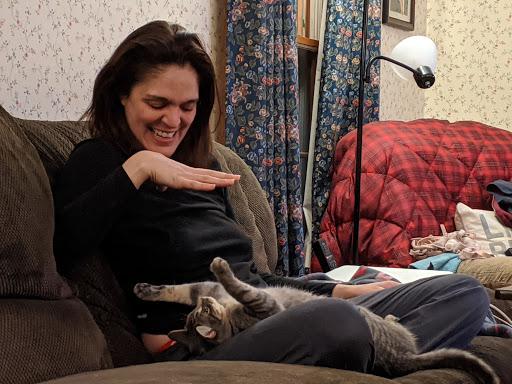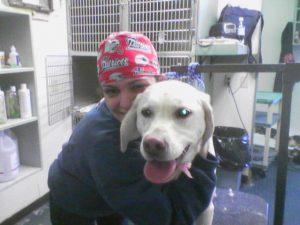-
About
- Leadership & Faculty
- News & Events
-
Admissions
-
Academics
- Graduate
- Advanced Clinical Training
- Continuing Education
-
Student Life
-
-
Accommodations
- Our Campus
-
Accommodations
- Graduate Resources
-
-
Research
-
Hospitals & Clinics
- Emergency Care
- Hospital Services
-
Community Outreach
- Volunteer
Harnessing Empathy in the Face of Emergencies
After the attacks of 9/11, Michelle Emmott decided to pursue her true passion. She’s now a veterinary technician in the Foster Hospital ER, nursing pets and teaching those around her.

Back in 2001, Michelle Emmott was a young professional living in Boston and making a good living as a recruiter—but she wasn’t fulfilled. Then, her life changed forever as she watched the events of the September 11 attacks unfold.
“I had recently lost my grandmother, and I realized that this would not be the life she would have wanted me to live,” explains Emmott. “I was reminded that life is short and you should just do what makes you happy. I decided to start over and pursue my passion.”
Emmott says she always had been interested in working with animals. However, she was encouraged from a young age to pursue the human side of medicine and graduated from college with a degree in speech pathology.
After 9/11, Emmott took the first step on her new career path by getting a job as a receptionist at a veterinary clinic. She then studied and worked her way up all the ranks at that practice—going on to become a veterinary assistant, then a veterinary technician, head veterinary technician, and finally hospital manager.
In 2016, Emmott joined the team at the Foster Hospital for Small Animals as a veterinary technician in the emergency and critical care (ECC) service.
“What I love about emergency and critical care is there’s no specific description of a day in the life. It’s always really unpredictable,” she says. “I feel like we’re really prepared for anything that comes through the door or anything that happens with our patients—we’re always in ready mode.”
Emmott didn’t always feel so confident in the ECC setting, however. Early on, she was concerned that her empathetic personality may not be a good fit. “I’m the type of person that will cry when my patient hurts or I lose a patient or an owner is upset. If an owner is crying, it’s going to hurt my heart. And I remember thinking, ‘Oh, I’m going to have to toughen up.’”
As Emmott began to find her feet in the field, she realized that her skills and personality worked to her benefit, even in an emergency. She’s seen innumerable tough cases. (Her most memorable was a dog that came in for what seemed like a routine issue but turned out to involve a cancerous mass and a weeks-long battle for his life.) And the empathy that she once feared could be a problem actually helps her from becoming discouraged in difficult situations.
Aside from the nursing aspect of her job, Emmott takes great pride and enjoyment in teaching—whether it’s working with students or training new veterinary technician hires. She and the other veteran techs help students learn hands-on skills, clinical skills, and how to communicate with clients.
“If you can teach somebody to do something that you can do, then you’re going to know that that person is going to be good at whatever you taught them. And that’s going to benefit the field anywhere they go,” she says. It’s a great feeling to watch that light bulb come on.”
Since COVID-19 changed the way in which the hospital operates—keeping both students (temporarily) and owners out of the hospital—Emmott has missed those teaching moments and interactions with owners. Still, her positivity and caring attitude shone through.
“At the peak of the pandemic, everybody was working together to figure things out, and it brought out the creativity in all of us,” she says. “That made us all really proud because we wanted to be there, and nothing was going to keep us from helping these animals.”
Emmott is thrilled that the veterinary students have returned to campus, and she’s looking forward to the day when there is more face-to-face contact with owners again.
Department:
Foster Hospital for Small Animals
